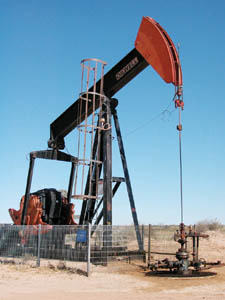![[Metroactive Features]](/features/gifs/feat468.gif)
[ Features Index | Silicon Valley | Metroactive Home | Archives ]
Light Summer Reading
The imminent shortage of oil is the new Y2K, the new nuclear threat, the new rapture
By Novella Carpenter
THOUGH SUMMER is the time to indulge in fluffy trifles like popsicles, flip-flops and books called French Women Don't Get Fat, I've been gorging myself on the end-of-oil disaster-scenario tomes. Amazon even has a list called Peak Oil, Post Carbon and Resource Depletion that includes Crossing the Rubicon, Powerdown: Options and Actions for a Post-Carbon World and The Party's Over: Oil, War and the Fate of Industrial Societies. A newcomer to the list is James Howard Kunstler's The Long Emergency: Surviving the End of the Oil Age, Climate Change and Other Converging Catastrophes of the Twenty-First Century. If I may sum up a 307-page book in two words: we're f*$&d.
The imminent shortage of oil is the new Y2K, the new nuclear threat, the new rapture. The difference between the end of oil and other end-of-the-world scenarios is that this one is actually inevitable. Kunstler's book describes the various scenarios that might occur when peak oil hits, and we begin the wobbly decline into the post-oil economy.
Many people believe alternative fuels won't help at all. I received a letter from reader Roland James a few days ago chiding me for writing about ethanol. He wrote, "Having helped harvest sugar beets in the Red River Valley of North Dakota and Minnesota, sugar beets aren't much an improvement over corn and are very much a part of the industrial agriculture of pesticides, herbicides, fertilizers and machinery. ... Global Climate Chaos, Global Oil Peak and the U.S. war response thereto will swamp everything else. ... Oil use will soon peak and decline causing essentially the collapse of modern, industrial societies."
This letter roughly paraphrases The Long Emergency, and the message is doom. The author of 17 books, Kunstler covered the OPEC oil crisis when he was a young reporter, which informs his work. He makes a special point to discredit most conspiracy theories on the grounds of disorganization, and the human foible of not being able to keep anything secret. The facts, once you examine them, don't require the huge leaps of faith of most conspiracy theories, either.
It's true that the Industrial Revolution, modernism—progress as we know it—has ridden on cheap fuel. Globalism—in particular, our ability to buy a $2 toothbrush that was shipped 15,000 miles away by boat, rail and truck before it arrived in our store—presupposes that fuel for these vessels will be plentiful and inexpensive. Kunstler predicts that "even mild to moderate deviations in either price or supply will crush our economy and make the logistics of daily life impossible." The book made me think about oil and gas in a whole different way—as a gift, a lark that provides the chocolate I eat, the computer I use, the fuel used to deliver my daily paper.
What about the hydrogen fuel cell, though, or some other wondrous technology? Kunstler is wary of what he calls the Jiminy Cricket syndrome of wishful thinking: "The best-case scenario may be that some of these technologies will take decades to develop—meaning that we can expect an extremely turbulent interval between the end of cheap oil and whatever comes next. A more likely scenario is that new fuels and technologies may never replace fossil fuels at the scale, rate and manner at which the world currently consumes them."
I've always romanticized the Roaring '20s, but in retrospect, the late 1990s and early aughts might be the most decadent times of all. Toothpicks shipped from China? Driving a single-occupancy car? Our children will be in awe at our cavalier way of life. The problem is how can I function with the collapse of modern society staring me down from the near future? I would argue that now is the time to start building a sustainable way of life, practice your farming skills and, most important, get together with your neighbors and friends and talk about these issues. And if the whole scare is just another Y2K? You won't regret being prepared.
[ Silicon Valley | Metroactive Home | Archives ]
Copyright © 2005 Metro Publishing Inc. Metroactive is affiliated with the Boulevards Network.
For more information about the San Jose/Silicon Valley area, visit sanjose.com.
![]()

Rev
Email Rev at [email protected].
Send a letter to the editor about this story to letters@metronews.com.
From the June 22-28, 2005 issue of Metro, Silicon Valley's Weekly Newspaper.